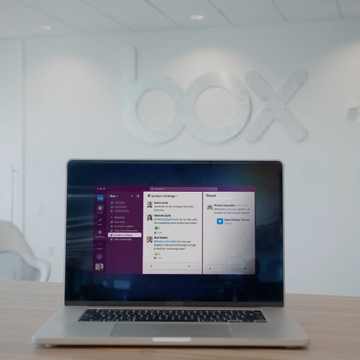Jägermeister has come a long way since its origins as a wine and vinegar factory in 1878. As the world’s best-selling premium liqueur, Jägermeister sold more than 100 million bottles last year globally and doubled its headcount from 500 to almost 1,000 employees.
Although Jägermeister’s secret recipe is rooted in tradition, the sweet digestif is a household name because its leaders value innovation. In fact, the company underwent a cultural change and digital transformation to ensure better global collaboration.
“We found that many departments were working alone, and that we needed to communicate better with each other to avoid duplicating work and save time in the future,” says Andrea Ostheer, corporate communications manager at Jägermeister.
Jägermeister needed to become faster, more open and more transparent. So when collaborating in email inboxes hindered internal communication, the company turned to Slack, the secure channel-based messaging platform, for a better way to work. Here’s a peek into how Jägermeister nurtures culture, creativity and swift communication in Slack channels, where teams can share messages, files and tools.

“When our collaboration team introduced me to Slack, I realized for the first time that my primarily e-mail-based communication is pretty old-school, and that I wasn’t fully tapping into the potential that the new world offers us.”
Discovering a faster way to communicate with Slack channels
Jägermeister’s marketing and corporate communications departments were introduced in 2018 to Slack at the annual South by Southwest conference in Austin, Texas. During the event, employees throughout the organization realized the platform offered a faster, more organized way to communicate than email or Jägernet, their established international social intranet.
Ultimately, Jägermeister’s teams needed more than their intranet’s “like and comment” feature to collaborate. So they brought Slack back home. Since the operations and IT team at Jägermeister Deutschland GmbH, led by Alexander Turk, was already using Slack across departments, they helped introduce the platform to the rest of the global company.
“Suddenly, you couldn’t forget to CC someone anymore,” says Ostheer. “When we onboarded new employees, we found that we could quickly catch them up to speed.”
With Slack, departments no longer communicate in closed silos. Instead, they set up a swift exchange of knowledge and experience across the company.
“When our collaboration team introduced me to Slack, I realized for the first time that my primarily e-mail-based communication is pretty old-school, and that I wasn’t fully tapping into the potential that the new world offers us,” says Christopher Ratsch, one of Jägermeister’s executive board members.
Shortly after Jägermeister rolled Slack out across the organization, the company’s internal email system failed due to an outage. But teammates were able to continue their work in Slack on their mobile and personal devices.

Both Ostheer and Ratsch say transparent communication in open channels is the be-all and end-all for successful collaboration at Jägermeister. Here are a couple of their top channels:
#status: Every morning before 9:30 a.m., all team members write a brief update on their work in progress.#int-all-coldbrew: Teams develop their game plan for introducing new products and share it here. What was previously a slow and static process via email has become a fast and dynamic one in Slack. Now stakeholders can come together and immediately start collaborating on product launches.
Scaling for international success in Slack
To bring Jägermeister into new markets, the company works with distribution partners abroad. For example, Italian liqueur company Campari distributes Jägermeister’s products in Italy. Jägermeister has also founded subsidiaries in Germany, the U.S., the U.K., the Czech Republic and Slovakia.
With Slack, global teams no longer communicate among themselves in closed silos. Slack allows them to share knowledge and experience across departmental and international boundaries.
Jägermeister’s cultural change was also driven by a determination to become the world’s number one premium spirits brand for young adults. To reach this goal, Jägermeister used Slack to communicate and reinforce the following values across the company:
- Focus on the customer
- Produce outstanding quality liqueur
- Continue to innovate

“I can work from home without any issues. Three years ago, that wouldn’t have been possible. Since we didn’t have laptops or Slack back then—everyone needed to go to work in the office.”
Connecting distributed teammates during Covid-19
Keeping collaboration organized has gained new importance in the wake of the coronavirus pandemic. Now that Jägermeister’s employees are distributed, they check in with each other in #best_of_homeoffice. Coworkers even share videos of a typical day in their home office.
“I can work from home without any issues,” Ostheer says. “Three years ago, that wouldn’t have been possible. Since we didn’t have laptops or Slack back then—everyone needed to go to work in the office. Looking back on that time, I think that anyone can surely see what it would be like today if we were still in that situation.”
Channel-based communication has revolutionized the way Jägermeister employees work, honoring its time-honored tradition while supporting innovation.















